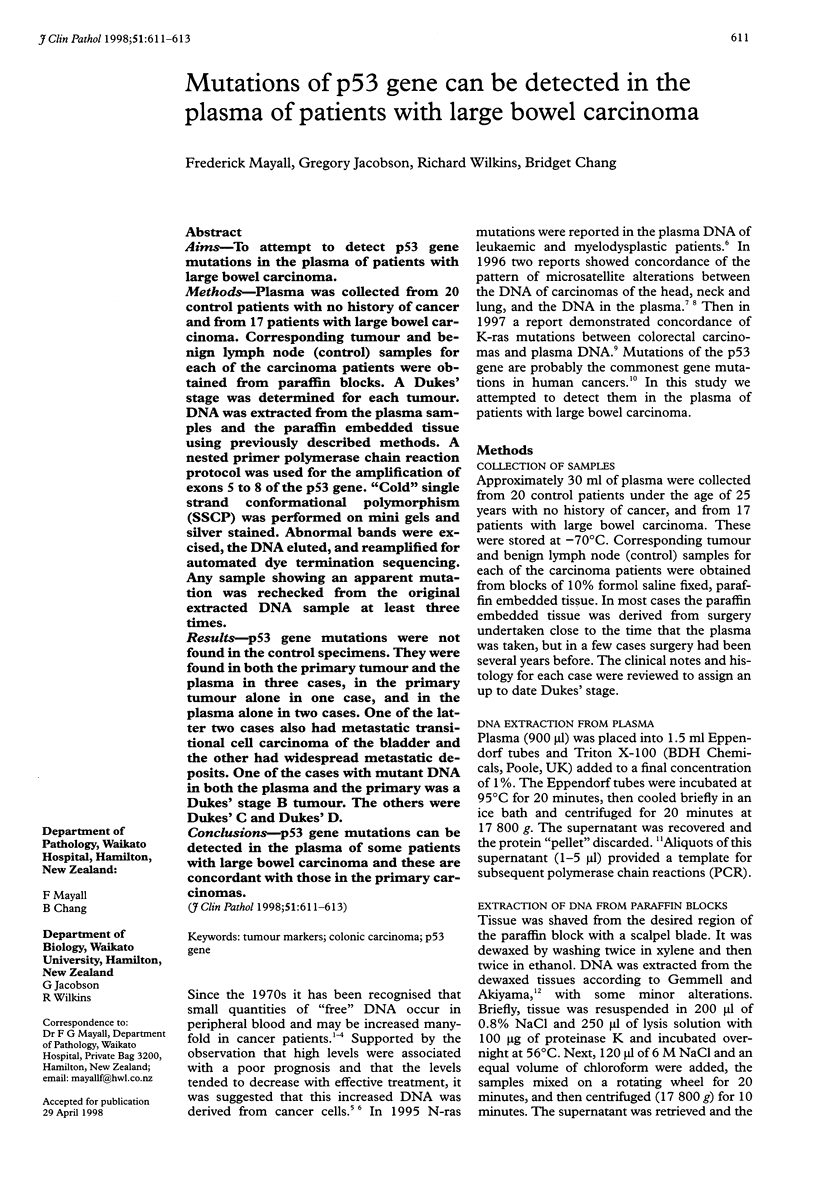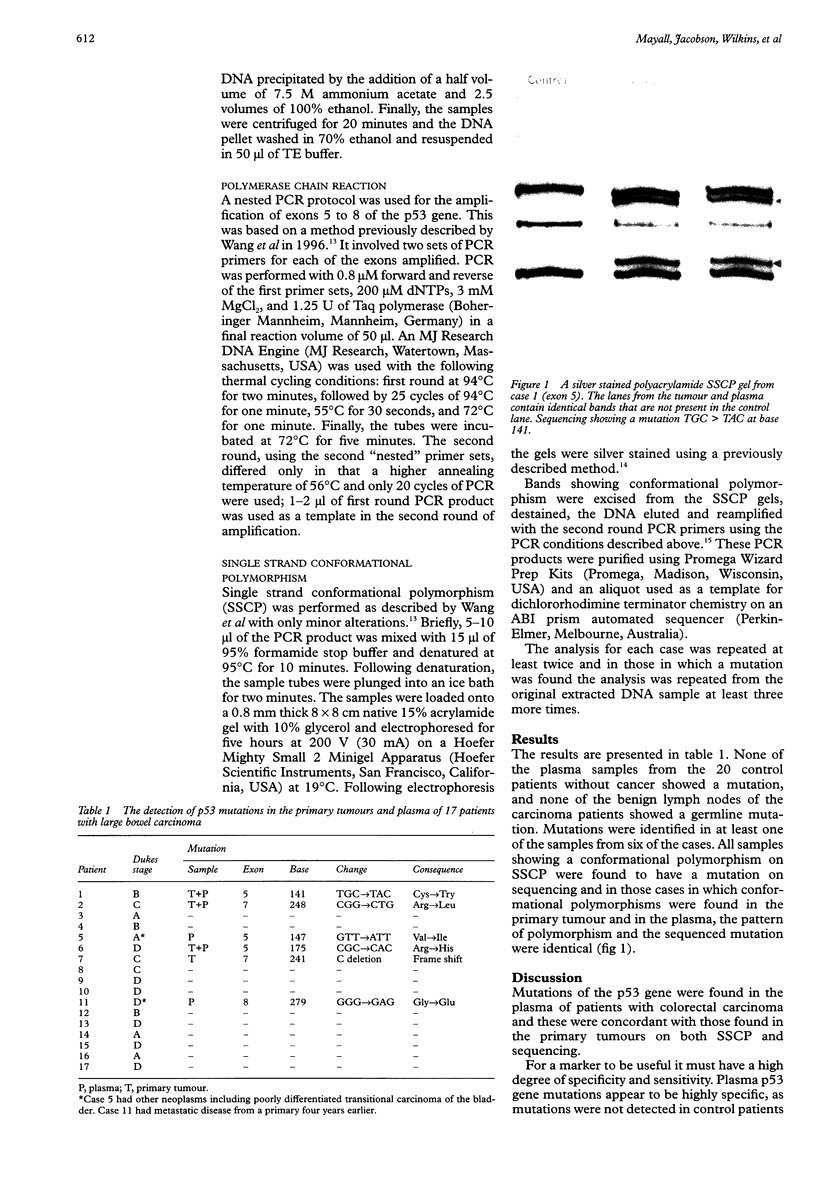Abstract
AIMS: To attempt to detect p53 gene mutations in the plasma of patients with large bowel carcinoma. METHODS: Plasma was collected from 20 control patients with no history of cancer and from 17 patients with large bowel carcinoma. Corresponding tumour and benign lymph node (control) samples for each of the carcinoma patients were obtained from paraffin blocks. A Dukes' stage was determined for each tumour. DNA was extracted from the plasma samples and the paraffin embedded tissue using previously described methods. A nested primer polymerase chain reaction protocol was used for the amplification of exons 5 to 8 of the p53 gene. "Cold" single strand conformational polymorphism (SSCP) was performed on mini gels and silver stained. Abnormal bands were excised, the DNA eluted, and reamplified for automated dye termination sequencing. Any sample showing an apparent mutation was rechecked from the original extracted DNA sample at least three times. RESULTS: p53 gene mutations were not found in the control specimens. They were found in both the primary tumour and the plasma in three cases, in the primary tumour alone in one case, and in the plasma alone in two cases. One of the latter two cases also had metastatic transitional cell carcinoma of the bladder and the other had widespread metastatic deposits. One of the cases with mutant DNA in both the plasma and the primary was a Dukes' stage B tumour. The others were Dukes' C and Dukes' D. CONCLUSIONS: p53 gene mutations can be detected in the plasma of some patients with large bowel carcinoma and these are concordant with those in the primary carcinomas.
Full text
PDF


Images in this article
Selected References
These references are in PubMed. This may not be the complete list of references from this article.
- Anker P., Lefort F., Vasioukhin V., Lyautey J., Lederrey C., Chen X. Q., Stroun M., Mulcahy H. E., Farthing M. J. K-ras mutations are found in DNA extracted from the plasma of patients with colorectal cancer. Gastroenterology. 1997 Apr;112(4):1114–1120. doi: 10.1016/s0016-5085(97)70121-5. [DOI] [PubMed] [Google Scholar]
- Chen X. Q., Stroun M., Magnenat J. L., Nicod L. P., Kurt A. M., Lyautey J., Lederrey C., Anker P. Microsatellite alterations in plasma DNA of small cell lung cancer patients. Nat Med. 1996 Sep;2(9):1033–1035. doi: 10.1038/nm0996-1033. [DOI] [PubMed] [Google Scholar]
- Dix B. R., Robbins P. D., Spagnolo D. V., Padovan G. L., House A. K., Iacopetta B. J. Clonal analysis of colorectal tumors using K-ras and p53 gene mutations as markers. Diagn Mol Pathol. 1995 Dec;4(4):261–265. doi: 10.1097/00019606-199512000-00006. [DOI] [PubMed] [Google Scholar]
- Fournié G. J., Courtin J. P., Laval F., Chalé J. J., Pourrat J. P., Pujazon M. C., Lauque D., Carles P. Plasma DNA as a marker of cancerous cell death. Investigations in patients suffering from lung cancer and in nude mice bearing human tumours. Cancer Lett. 1995 May 8;91(2):221–227. doi: 10.1016/0304-3835(95)03742-f. [DOI] [PubMed] [Google Scholar]
- Gemmell N. J., Akiyama S. An efficient method for the extraction of DNA from vertebrate tissues. Trends Genet. 1996 Sep;12(9):338–339. doi: 10.1016/s0168-9525(96)80005-9. [DOI] [PubMed] [Google Scholar]
- Harris A. L. Mutant p53--the commonest genetic abnormality in human cancer? J Pathol. 1990 Sep;162(1):5–6. doi: 10.1002/path.1711620103. [DOI] [PubMed] [Google Scholar]
- Kohata Y. [Detection of K-ras point mutations in the stool of patients with colorectal tumors]. Nihon Shokakibyo Gakkai Zasshi. 1996 Jun;93(6):391–397. [PubMed] [Google Scholar]
- Leon S. A., Shapiro B., Sklaroff D. M., Yaros M. J. Free DNA in the serum of cancer patients and the effect of therapy. Cancer Res. 1977 Mar;37(3):646–650. [PubMed] [Google Scholar]
- Mulcahy H. E., Croke D. T., Farthing M. J. Cancer and mutant DNA in blood plasma. Lancet. 1996 Sep 7;348(9028):628–628. doi: 10.1016/S0140-6736(05)65067-2. [DOI] [PubMed] [Google Scholar]
- Nawroz H., Koch W., Anker P., Stroun M., Sidransky D. Microsatellite alterations in serum DNA of head and neck cancer patients. Nat Med. 1996 Sep;2(9):1035–1037. doi: 10.1038/nm0996-1035. [DOI] [PubMed] [Google Scholar]
- Peats S. Quantitation of protein and DNA in silver-stained agarose gels. Anal Biochem. 1984 Jul;140(1):178–182. doi: 10.1016/0003-2697(84)90150-7. [DOI] [PubMed] [Google Scholar]
- Sidransky D., Tokino T., Hamilton S. R., Kinzler K. W., Levin B., Frost P., Vogelstein B. Identification of ras oncogene mutations in the stool of patients with curable colorectal tumors. Science. 1992 Apr 3;256(5053):102–105. doi: 10.1126/science.1566048. [DOI] [PubMed] [Google Scholar]
- Smith-Ravin J., England J., Talbot I. C., Bodmer W. Detection of c-Ki-ras mutations in faecal samples from sporadic colorectal cancer patients. Gut. 1995 Jan;36(1):81–86. doi: 10.1136/gut.36.1.81. [DOI] [PMC free article] [PubMed] [Google Scholar]
- Soong R., Iacopetta B. J. A rapid and nonisotopic method for the screening and sequencing of p53 gene mutations in formalin-fixed, paraffin-embedded tumors. Mod Pathol. 1997 Mar;10(3):252–258. [PubMed] [Google Scholar]
- Stroun M., Anker P., Lyautey J., Lederrey C., Maurice P. A. Isolation and characterization of DNA from the plasma of cancer patients. Eur J Cancer Clin Oncol. 1987 Jun;23(6):707–712. doi: 10.1016/0277-5379(87)90266-5. [DOI] [PubMed] [Google Scholar]
- Stroun M., Anker P., Maurice P., Lyautey J., Lederrey C., Beljanski M. Neoplastic characteristics of the DNA found in the plasma of cancer patients. Oncology. 1989;46(5):318–322. doi: 10.1159/000226740. [DOI] [PubMed] [Google Scholar]
- Vasioukhin V., Anker P., Maurice P., Lyautey J., Lederrey C., Stroun M. Point mutations of the N-ras gene in the blood plasma DNA of patients with myelodysplastic syndrome or acute myelogenous leukaemia. Br J Haematol. 1994 Apr;86(4):774–779. doi: 10.1111/j.1365-2141.1994.tb04828.x. [DOI] [PubMed] [Google Scholar]



